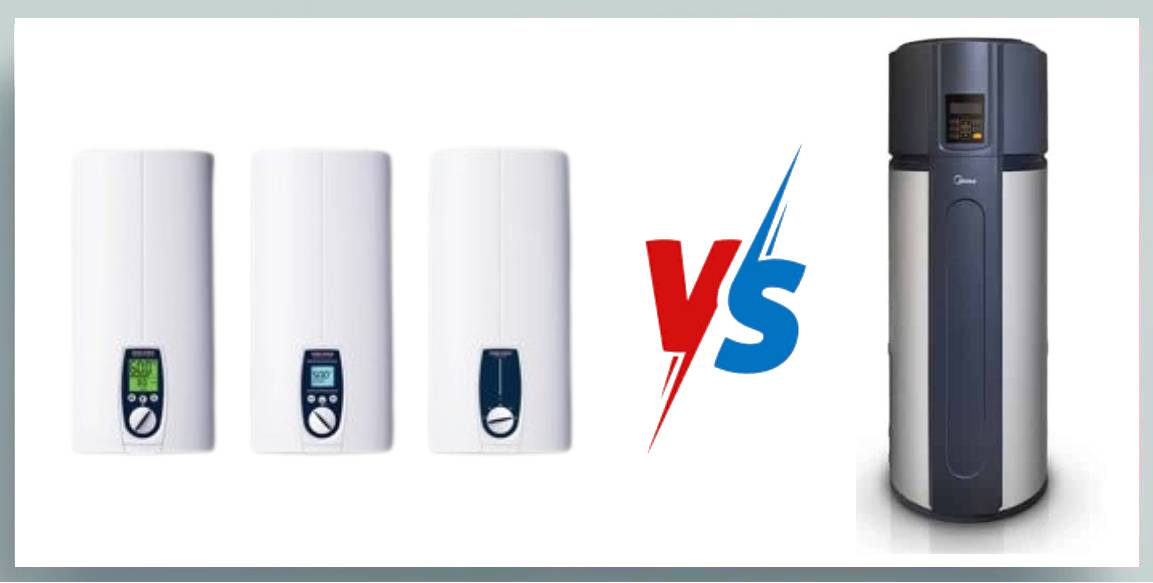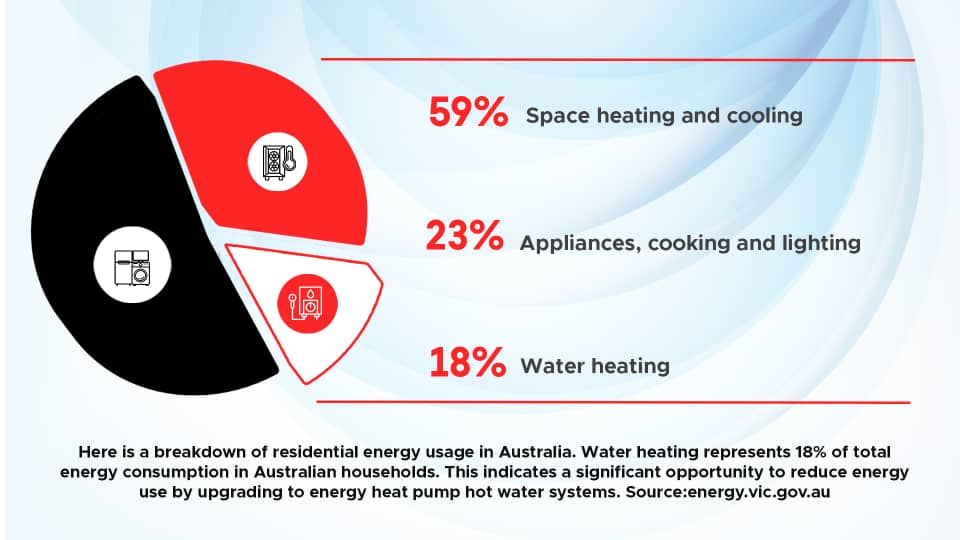
Australians’ energy costs are rising rapidly, which is why the number of water heater systems installed in Australia increased by […]

As an Australian looking for an affordable domestic hot water solution, you probably want a direct answer whether electric heaters or heat pumps are the best water heating system.
It’s not easy to figure this out on your own, considering that heat pumps are new entries in the industry so most people may not know about them yet.
To help you choose the better system, this post will compare these two types of water heaters. Read through it keenly and the answer will be at your fingertips by the end, so let’s begin!
Electric instant water heaters, otherwise known as tankless water heaters, are available in 50% of Australian homes without a storage tank.
When hot water is needed, cold water travels through a pipe into the unit where it is rapidly heated by an electric element. The heated water continues to flow through the pipe to the outlet and provides hot flowing water instantly.
Heat pumps for heating water are new in the domestic hot water industry.
These systems do not generate heat directly but rather use electricity to move heat from one location to another to warm up water efficiently. Basically, this involves moving heat from either air or ground sources into the liquid using a refrigerant.
Before deciding on the best water heater, you must think about energy usage. After all, you want an upgrade that will save energy!
That being said, heat pumps tend to use energy more efficiently than their counterparts. The units only need electric energy to transfer heat not to create it as already existing heat is simply extracted from the air.
The heat transfer process requires very little energy consumption. Typically, heat pumps have a CoP of 3 – 4 so they only need a single electrical unit to capture and transfer up to four units of heat energy.
This higher CoP leads to huge savings. According to DCCEEW, it reduces energy consumption by more than 70%.
On the contrary, electric water heaters rely on a resistive coil to provide water. These coils draw a lot of energy, rendering electric water heaters quite expensive to run over time.

The second factor that can help you easily choose between electric water heaters and heat pumps is their environmental impact. The aim is to choose a system that promises a to conserve the environment for the future.
In this regard heat pumps once again win. They use less energy thereby reducing the pressure to generate electricity from fossil fuels. They are therefore responsible for negligible emissions.
This is supported by Future Energy Skills Australia that claims that an Australian modern heat pump emits 65% to 75% compared to a standard electric water heater.
Clearly, the difference in emission can help you lower your carbon footprint if you choose a heat pump water heater.
The cost associated with installing a heat pump and a standard electric heater in Australia varies depending on several factors like the unit size, the complexity of the installation and whether additional components are needed.
Nevertheless, electric water heating beats heat pumps in this case. According to Australia Energy Upgrades, electric heaters are affordable to purchase and install. You will need around $300 for a small unit to $1,500 for larger units.
On the flip side, the price of a heat pump unit (not including installation) is much higher than buying and installing a standard electric water heater. Based on the same source, the cost of acquisition alone is around $2,500 to $4,000.
Although heat pumps are associated with higher initial costs, their long-term cost savings enable them to recoup this cost. Further, government and local authorities’ rebates and incentives reduce the cost making them even more affordable.
You want to invest in a hot water system that will serve you and possibly serve the next generation, right?
In that case, you should go with heat pump water heaters that last up to 20 years compared to 15 years for electric heaters as per Cyanergy.
They tend to last longer as they do not have resistive electric heating elements which are known to accelerate wear and tear in electric heaters.
Moreover, heat pumps are built with the Australian climate in mind.
They thus feature robust construction that will last no matter the weather or the water conditions. The durability is usually reflected in their longer warranties – they exceed those accompanying electric heaters which is a clear indication of their durability.
Heat pumps’ longer lifespan means less frequent replacement further saving on your hot water bills.
Both heat pump water heaters and electric instant water heaters have their own unique installation and maintenance requirements.
Heat pumps are bulkier and more complex to install. They may require a lot of installation activities like preparing the installation site so that it’s well-ventilated, dealing with a lot of piping or ductwork and a lot of assembling.
Installing electric heaters does not require as much work. You can readily mount the heater on a wall if there is a power supply and water connection.
However, be warned that these electric heaters may require more frequent maintenance than heat pumps, as you will have to deal with issues such as descaling or cleaning, to ensure optimal performance.
The climate conditions of the region you reside in Australia can have a big say on the best hot water system for you. For example, heat pumps work the best in warmer areas since heat energy is abundant in the air.
However, in colder areas below – 15 degrees Celsius, a heat pump might work with reduced efficiency and this means it will need to work harder to meet hot water demands.
Conversely, electric instant water heaters may not be affected by climatic conditions – whether it is cold or hot, these systems will continue providing water so long as they are connected to the grid.
When purchasing a hot water system, you must think about its size and then consider your available space, so you don’t end up with a unit bigger than your available space.
This is particularly important if you are installing a heat pump water heater. They tend to be bigger so you will need to dedicate enough space for the installation. The space requirement is as follows according to EnergyLabs.
For electric heaters, space will never be a huge concern. They are compact and can fit in most households.
The quantity of water you need and how fast you need it is yet another thing that separates heat pumps from electric heaters.
If you need a large volume of hot water instantly, an electric water heater will readily provide that, since there’s no waiting period before getting hot water.
Heat pumps can also provide you with hot water when you need it, but only if you have a huge tank. With smaller tanks, limitations will set in because these systems need to heat and store water before availing it.
If you remember from the discussion above, the Australian government provides rebates and incentives for those that have installed recognized industrial heat pump hot water systems. Those rebates can help pay some of the initial costs and make installing a heat pump water heater more cost-effective.
As an example, the Small-scale Renewable Energy Scheme provides incentives to assist individuals in getting their qualified systems and this markedly reduces the necessary initial expenditure to install a heat pump system
For electric tank water heaters, you hardly get any financial aid when purchasing and installing. That means you will pay everything out of your own pocket. Combining this with their endless running costs, electric heaters become an expensive option for Australian homes.
Though heat pump water heaters and electric instant water heaters each have their own advantages, the clear winner is heat pump technology as it offers the best combination of energy efficiency and low long-term running costs.
Yes, heat pump water heaters carry a higher initial cost, but Australian Government rebates and incentives can alleviate that. Also, the higher energy efficiency of heat pump systems means lower utility bills and cost savings over time eventually repay themselves.
So, when selecting your hot water system, it is rewarding to choose heat pumps.